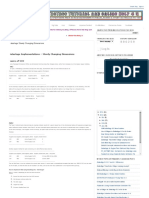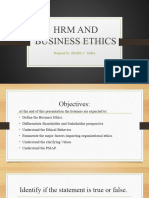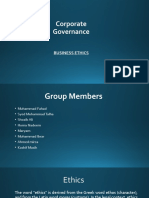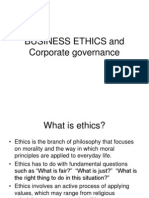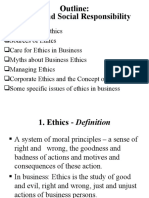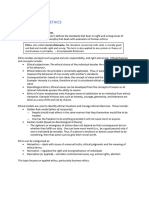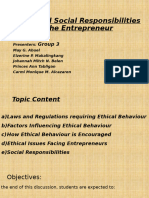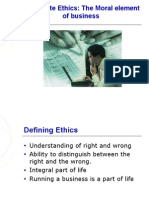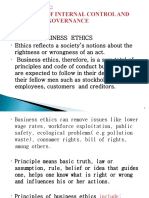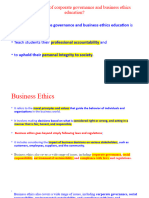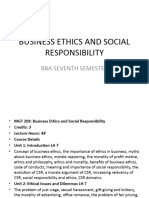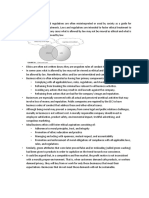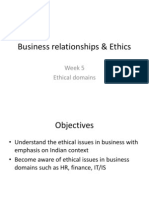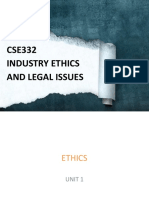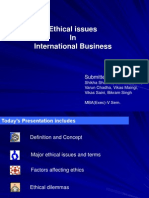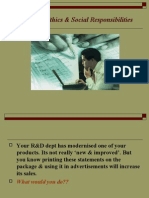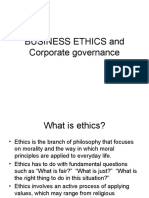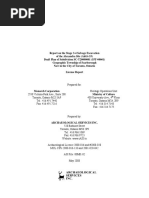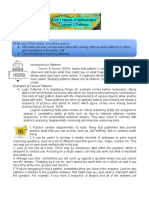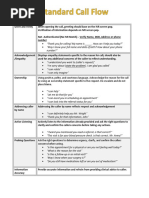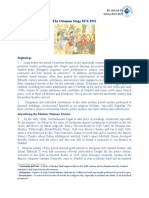0 ratings0% found this document useful (0 votes)
27 viewsBusiness Ethics Chapter Four
Business Ethics Chapter Four
Uploaded by
Abdirizak Ali AbdillahiThis document discusses key concepts in business ethics including defining ethics, ethical conduct, and codes of conduct. It also examines applying ethics to corporations and addresses globalization, cultural differences, and technology related issues in business ethics. Specific principles of ethical conduct discussed are competing fairly, communicating truthfully, and not causing harm to others.
Copyright:
© All Rights Reserved
Available Formats
Download as PPTX, PDF, TXT or read online from Scribd
Business Ethics Chapter Four
Business Ethics Chapter Four
Uploaded by
Abdirizak Ali Abdillahi0 ratings0% found this document useful (0 votes)
27 views18 pagesThis document discusses key concepts in business ethics including defining ethics, ethical conduct, and codes of conduct. It also examines applying ethics to corporations and addresses globalization, cultural differences, and technology related issues in business ethics. Specific principles of ethical conduct discussed are competing fairly, communicating truthfully, and not causing harm to others.
Original Description:
Abdisamed allaale
Original Title
BUSINESS ETHICS CHAPTER FOUR
Copyright
© © All Rights Reserved
Available Formats
PPTX, PDF, TXT or read online from Scribd
Share this document
Did you find this document useful?
Is this content inappropriate?
This document discusses key concepts in business ethics including defining ethics, ethical conduct, and codes of conduct. It also examines applying ethics to corporations and addresses globalization, cultural differences, and technology related issues in business ethics. Specific principles of ethical conduct discussed are competing fairly, communicating truthfully, and not causing harm to others.
Copyright:
© All Rights Reserved
Available Formats
Download as PPTX, PDF, TXT or read online from Scribd
Download as pptx, pdf, or txt
0 ratings0% found this document useful (0 votes)
27 views18 pagesBusiness Ethics Chapter Four
Business Ethics Chapter Four
Uploaded by
Abdirizak Ali AbdillahiThis document discusses key concepts in business ethics including defining ethics, ethical conduct, and codes of conduct. It also examines applying ethics to corporations and addresses globalization, cultural differences, and technology related issues in business ethics. Specific principles of ethical conduct discussed are competing fairly, communicating truthfully, and not causing harm to others.
Copyright:
© All Rights Reserved
Available Formats
Download as PPTX, PDF, TXT or read online from Scribd
Download as pptx, pdf, or txt
You are on page 1of 18
CHAPTER FOUR
ETHICAL PRINCIPLES IN BUSINESS
Ethics
• Ethics is the study of moral
standards, the process of
examining the moral standards of
a person or society to determine
whether these standards are
reasonable or unreasonable in
order to apply them to concrete
situations and issues.
Concept of Ethical Conduct
• Having known the meaning and
importance of business ethics, we
can see that wanting to be an
ethical corporate citizen is not
enough; individuals in business
must actively practice ethical
conduct.
Cont…
• In business, besides obeying
laws and regulations, a good
and ethical conduct involves
the followings.
Competing fairly and honestly:
• businesses are expected to
compete fairly and honestly and
not knowingly deceive, intimidate,
or misrepresent customers,
competitors, clients, or
employees.
Communicating truthfully:
• Ethical conduct requires that
companies refrain from issuing
false or misleading
communications.
• Businesses should recognise that
their communications reflect their
image and therefore refrain from
untruthful, offensive and
misleading communications.
Not causing harm to others:
• Some business executives put
their own personal interests
ahead of that of employees
and shareholders thereby
causing harm to them.
Cont…
• Corporate managers can mislead
investors by withholding vital
information; they sometimes take
advantage of the investor by using
the company’s earnings or
resources for personal gain.
Code of Conduct
• A code of conduct is a written
statement, setting forth the
principles that guide an
organisation’s decision.
• An effective code of conduct
requires the following.
Cont…
• Top management commitment
• Employee communications efforts
• Employee commitment to follow it.
• Formal training programmes
• A system that supports reporting
unethical or illegal actions at work
• A system of action.
Applying Ethics to Corporate Organisations
• The statement that corporate
organisations can be ethical or
unethical raises a puzzling
issue.
Globalisation, Multinational and
Business Ethics
• Many of the most pressing
issues in business ethics
today are related to the
phenomenon of globalization.
Cont…
• Globalization is the worldwide
process by which the economic
and social systems of nations have
become connected together so that
goods, services, capital, knowledge
and cultural artifacts are traded
and moved across national
borders, at an increasing rate.
Business Ethics and Cultural Differences
• When faced with the fact that
different cultures have different
moral standards, the managers of
some multinationals have adopted
the theory of ethical relativism.
Cont…
• Ethical relativism is the theory that,
because different societies have
different ethical beliefs, there is no
rational way of determining whether
an action is morally right or wrong
other than by asking whether the
people of this or that society believe
it is morally right or wrong.
Business Ethics and Technology
• Technology consists of all
those methods, processes, and
tools that humans invent to
manipulate their environment.
Cont…
• To an extent never before realised
in history, contemporary business
is being continuously and
radically transformed by the rapid
evolution of new technologies that
raise new ethical issues for
business.
You might also like
- Christmas Nativity Set2Document26 pagesChristmas Nativity Set2alejandra gonzalez100% (6)
- Chapter 1 ETHICS AND ITS SIGNIFICANCE IN THE BUSINESS DISCIPLINEDocument16 pagesChapter 1 ETHICS AND ITS SIGNIFICANCE IN THE BUSINESS DISCIPLINENorkhaiihiidayah WatiieNo ratings yet
- Moral Philosophy and BusinessDocument10 pagesMoral Philosophy and Businesssahil0% (1)
- Job Interview Cheat Sheet V1.1Document3 pagesJob Interview Cheat Sheet V1.1-FedeCostas ツNo ratings yet
- 31.1 Esl Topics Bonus Travel LessonDocument11 pages31.1 Esl Topics Bonus Travel LessonNiin NiniNo ratings yet
- Datastage Slowly Changing DimensionsDocument10 pagesDatastage Slowly Changing DimensionsrameshchinnaboinaNo ratings yet
- Chapter 8 Magt (75p)Document75 pagesChapter 8 Magt (75p)Firaol TayeNo ratings yet
- Masteral ReportDocument58 pagesMasteral ReportJessel YaraNo ratings yet
- Business Ethics: Chandrima Agnihotri Maanas Salim Ruchi Kumari Shipra Yadav Sneha SinghDocument22 pagesBusiness Ethics: Chandrima Agnihotri Maanas Salim Ruchi Kumari Shipra Yadav Sneha SinghSneha SinghNo ratings yet
- Module I EthicsDocument29 pagesModule I Ethicsurbashi.ucNo ratings yet
- Business Ethics, Social Audit & Coporate Governance: Click To Edit Master Subtitle StyleDocument25 pagesBusiness Ethics, Social Audit & Coporate Governance: Click To Edit Master Subtitle StyleSherya YadavNo ratings yet
- MODULE 6Document41 pagesMODULE 6uditrajput8200No ratings yet
- Professional EthicsDocument54 pagesProfessional EthicsrobykanaelNo ratings yet
- C.G (Pres 1)Document22 pagesC.G (Pres 1)Huma NadeemNo ratings yet
- Cgbe 1Document14 pagesCgbe 1anjali shilpa kajalNo ratings yet
- Business Ethics - PPT NewDocument18 pagesBusiness Ethics - PPT New01712154645No ratings yet
- Outline: Ethics and Social ResponsibilityDocument30 pagesOutline: Ethics and Social ResponsibilityArafat HossainNo ratings yet
- Business Ethics, CSR & Sustainability 2022Document38 pagesBusiness Ethics, CSR & Sustainability 2022Sherry Lai100% (1)
- Introduction To Business Ethics: Instructor Ms. Indra MughalDocument11 pagesIntroduction To Business Ethics: Instructor Ms. Indra MughalShamsuddin SoomroNo ratings yet
- Business EthicsDocument25 pagesBusiness EthicsAish RaoNo ratings yet
- Business EthicsDocument20 pagesBusiness Ethicsaviannaryeee26No ratings yet
- Business EthicsDocument18 pagesBusiness EthicsMohammad Arif HasanNo ratings yet
- Ethical and Social Responsibilities of The Entrepreneur (Final)Document17 pagesEthical and Social Responsibilities of The Entrepreneur (Final)maygabuelNo ratings yet
- Business EthicsDocument18 pagesBusiness Ethicsmarkjayson.cruzNo ratings yet
- Corporate Ethics: The Moral Element of BusinessDocument23 pagesCorporate Ethics: The Moral Element of Businessraheel911No ratings yet
- Ethics Lecture 8Document17 pagesEthics Lecture 8Paresh SwamiNo ratings yet
- Introduction To Business Ethics / Understanding Corporate Social ResponsibilityDocument56 pagesIntroduction To Business Ethics / Understanding Corporate Social ResponsibilityShalle said AdenNo ratings yet
- Business Ethics and Corporate Social ReDocument42 pagesBusiness Ethics and Corporate Social ReRegine Joy Engada100% (1)
- Code-Of-ethics For Business - SBDocument38 pagesCode-Of-ethics For Business - SBDump GandaraNo ratings yet
- Code-Of-ethics For Business - SBDocument38 pagesCode-Of-ethics For Business - SBDump GandaraNo ratings yet
- Dac 204 Lecture 1 - 2Document31 pagesDac 204 Lecture 1 - 2raina mattNo ratings yet
- MNGT6e CH04 PowerPoint SlidesDocument32 pagesMNGT6e CH04 PowerPoint Slidesshirleygebenga020829No ratings yet
- Week#2 Sp-24Document42 pagesWeek#2 Sp-24Wesley HalbrookNo ratings yet
- 1 - Business Ethics and GovernanaceDocument30 pages1 - Business Ethics and Governanace321159No ratings yet
- Business Ethics 2Document52 pagesBusiness Ethics 2mamtakmr2No ratings yet
- Chapter One IntroductionDocument78 pagesChapter One IntroductionUjwal HamalNo ratings yet
- Professional Ethics UNIT IDocument17 pagesProfessional Ethics UNIT Iharshyadav11590No ratings yet
- Ethics and LawDocument1 pageEthics and LawAbby NavarroNo ratings yet
- Business Relationships & Ethics: Week 5 Ethical DomainsDocument39 pagesBusiness Relationships & Ethics: Week 5 Ethical DomainsVasu SinglaNo ratings yet
- CH 3 Emerging Business Ethics IssuesDocument13 pagesCH 3 Emerging Business Ethics Issuesfatima zaheerNo ratings yet
- Unit4business EthicsDocument20 pagesUnit4business Ethicssuhasm11111111No ratings yet
- CSE332 Industry Ethics and Legal IssuesDocument55 pagesCSE332 Industry Ethics and Legal IssuesAnuj SinghNo ratings yet
- Unit IDocument21 pagesUnit Ikush mandaliaNo ratings yet
- INFS 452 - Computer Ethics & Society: Ethics in Information Technology by George W. ReynoldsDocument21 pagesINFS 452 - Computer Ethics & Society: Ethics in Information Technology by George W. Reynoldsفضل الفقيةNo ratings yet
- Ehical Issues in International Business2Document32 pagesEhical Issues in International Business2Sharma ShikhaNo ratings yet
- Business Ethics and Human Values: Mba CP 107Document41 pagesBusiness Ethics and Human Values: Mba CP 107farru84No ratings yet
- Corporate Ethics & Social ResponsibilitiesDocument22 pagesCorporate Ethics & Social Responsibilitiesisb2009No ratings yet
- Social Responsibility and The Need For Ethical BehaviorDocument19 pagesSocial Responsibility and The Need For Ethical Behaviorceejay05casilanNo ratings yet
- Applied Ethics Bus EthicsDocument20 pagesApplied Ethics Bus EthicsJoy ArellanoNo ratings yet
- Ethics in Management FunctionsDocument11 pagesEthics in Management Functions321159No ratings yet
- Lesson 4 - Codes of Ethics and Business ConductDocument5 pagesLesson 4 - Codes of Ethics and Business ConductJose Emmanuel CalagNo ratings yet
- Business Ethics Concepts and Professional EthicsDocument10 pagesBusiness Ethics Concepts and Professional EthicsGaurav ChavhanNo ratings yet
- Chapter 6 ETHICAL ISSUES AND SOCIAL RESPONSIBILITY OF ENTREPRENEURS Chapter 6Document4 pagesChapter 6 ETHICAL ISSUES AND SOCIAL RESPONSIBILITY OF ENTREPRENEURS Chapter 6Kariuki CharlesNo ratings yet
- Lesson 2 NOTES Business Ethics An OverviewDocument3 pagesLesson 2 NOTES Business Ethics An OverviewSafh SalazarNo ratings yet
- Ethics and Corporate GovernanceDocument13 pagesEthics and Corporate GovernanceNavaneeth KunnilNo ratings yet
- Business Ethics and Leadership PPTDocument14 pagesBusiness Ethics and Leadership PPThamdi abdrhmanNo ratings yet
- Ethics in ManagementDocument32 pagesEthics in ManagementPriyanka Prasad B GNo ratings yet
- BEth Ethics Note All CombinedDocument256 pagesBEth Ethics Note All CombinedmaheshbikashnewsNo ratings yet
- BE (Chapter 1-6) PDFDocument20 pagesBE (Chapter 1-6) PDFdyd37No ratings yet
- Business Ethics-UNIT-1Document8 pagesBusiness Ethics-UNIT-1Abhishek PalNo ratings yet
- Chapter 4 - Managerial Ethics and Corporate Social ResponsibilityDocument17 pagesChapter 4 - Managerial Ethics and Corporate Social ResponsibilitySelena ReidNo ratings yet
- DK Essential Managers: Ethical Business: Sustainability, Commitment, Values, Transparency, EnvironmentFrom EverandDK Essential Managers: Ethical Business: Sustainability, Commitment, Values, Transparency, EnvironmentNo ratings yet
- The Ethical Executive: Navigating Moral Dilemmas In The Corporate WorldFrom EverandThe Ethical Executive: Navigating Moral Dilemmas In The Corporate WorldRating: 5 out of 5 stars5/5 (1)
- CASE STUDY TwoDocument4 pagesCASE STUDY TwoAbdirizak Ali AbdillahiNo ratings yet
- Research MethodologyDocument97 pagesResearch MethodologyAbdirizak Ali AbdillahiNo ratings yet
- Chapter Three: The Location Decisions of Firms and Development of CitiesDocument46 pagesChapter Three: The Location Decisions of Firms and Development of CitiesAbdirizak Ali AbdillahiNo ratings yet
- Chapter Three: The Nature of Small BusinessDocument30 pagesChapter Three: The Nature of Small BusinessAbdirizak Ali AbdillahiNo ratings yet
- Business Ethics CHAPTER TWODocument23 pagesBusiness Ethics CHAPTER TWOAbdirizak Ali AbdillahiNo ratings yet
- USA Harvard MIT Mathematics Tournament 2014 139Document12 pagesUSA Harvard MIT Mathematics Tournament 2014 139Oki VnnNo ratings yet
- Football: Several Codes of Football. Images, From Top To Down, Left To Right:, ,, A Scrum,, andDocument170 pagesFootball: Several Codes of Football. Images, From Top To Down, Left To Right:, ,, A Scrum,, andDinesh RajputNo ratings yet
- Syllabus AMST1510 Museum Collecting and Collections, Fall 2015Document9 pagesSyllabus AMST1510 Museum Collecting and Collections, Fall 2015Steven Lubar0% (1)
- Report On The Stage 3-4 Salvage Excavation of The Alexandra SiteDocument299 pagesReport On The Stage 3-4 Salvage Excavation of The Alexandra SiteT.O. Nature & DevelopmentNo ratings yet
- Taking God SeriouslyDocument11 pagesTaking God SeriouslyFavela777No ratings yet
- Simple Past Listen and Write. There Is One ExampleDocument6 pagesSimple Past Listen and Write. There Is One ExampleCamilo MorenoNo ratings yet
- Unit 1 Nature of Mathematics Lesson 2 PatternsDocument9 pagesUnit 1 Nature of Mathematics Lesson 2 PatternsChris Esterioso NotarionNo ratings yet
- 11price Determination Under Perfect CompetitionDocument22 pages11price Determination Under Perfect CompetitionMonika JhaNo ratings yet
- Criminal Investigation (LEA) Use CaseDocument2 pagesCriminal Investigation (LEA) Use CaseDewa AsmaraNo ratings yet
- Biochemistry of CancerDocument20 pagesBiochemistry of CancerJimmy WongNo ratings yet
- Hotel Monaco Chicago - Grp3Document2 pagesHotel Monaco Chicago - Grp3Sandeep NayakNo ratings yet
- Guidelines For Special Training To OOSC Admitte Under RTEDocument86 pagesGuidelines For Special Training To OOSC Admitte Under RTEVIJAY KUMAR HEERNo ratings yet
- 001 2017 Pragmatic Entailment ExercisesDocument1 page001 2017 Pragmatic Entailment ExercisesLencina AndreaNo ratings yet
- Dot Card and Ten Frame Package2005Document37 pagesDot Card and Ten Frame Package2005Amalina MahianNo ratings yet
- Vocabulary List - Form 6: Weather Climate 2) To Look Out For STHDocument6 pagesVocabulary List - Form 6: Weather Climate 2) To Look Out For STHapi-301439658No ratings yet
- Sample Call Flow For Graded Role PlayDocument2 pagesSample Call Flow For Graded Role PlayLloyd Eman BalucosNo ratings yet
- FIM-01-Nepalese Financial SystemDocument16 pagesFIM-01-Nepalese Financial Systemrajbikram100% (1)
- MDS-6-Mock-exam-QAE - Unlocked FINALDocument70 pagesMDS-6-Mock-exam-QAE - Unlocked FINALSubhashNo ratings yet
- 024 - Mercado Vs ManzanoDocument2 pages024 - Mercado Vs ManzanoPatrick ManaloNo ratings yet
- The Ottoman StageDocument4 pagesThe Ottoman StageJamesbond 008 TvNo ratings yet
- LAS 2 Quarter 2 Learning Activity Sheet (Las) in Disciplines and Ideas in Social Sciences (Diss)Document4 pagesLAS 2 Quarter 2 Learning Activity Sheet (Las) in Disciplines and Ideas in Social Sciences (Diss)Cokiemenia Lusarita100% (2)
- Lecture 02 Electrical Networks Transfer FunctionDocument18 pagesLecture 02 Electrical Networks Transfer FunctionRammay SbNo ratings yet
- Course Plan HCIDocument9 pagesCourse Plan HCISathyanarayananNo ratings yet
- Folleto de Las Características Del Programa de FormaciónDocument2 pagesFolleto de Las Características Del Programa de FormaciónacilegnaNo ratings yet
- The Devil's DiscipleDocument4 pagesThe Devil's DiscipleTeodor MihaiNo ratings yet
- Asian Terminals Vs Simon EnterprisesDocument2 pagesAsian Terminals Vs Simon EnterprisesMichelle Montenegro - AraujoNo ratings yet





